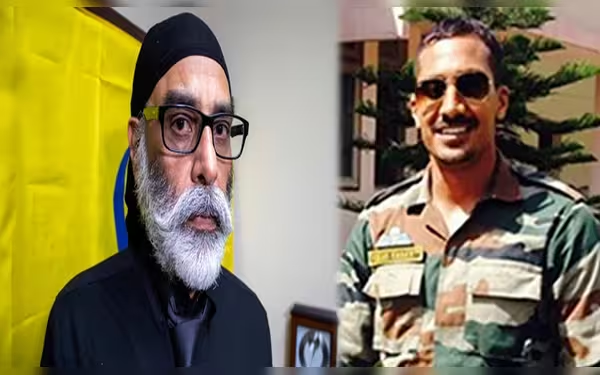Thursday, November 7, 2024 12:47 PM
US Charges Former RAW Officer in Sikh Leader Assassination Plot
- US charges Vikash Yadav in assassination conspiracy.
- Plot aimed at Sikh separatist Gurpatwant Singh Pannun.
- Tensions rise between India, US, and Canada.
 Image Credits: gnnhd
Image Credits: gnnhdThe US charges former RAW officer Vikash Yadav in a foiled plot to assassinate Sikh leader Gurpatwant Singh Pannun, raising international tensions.
In a significant development, the United States has charged a former Indian intelligence officer, Vikash Yadav, in connection with a foiled plot to murder a Sikh separatist leader in New York City. This incident has raised serious concerns about international espionage and the lengths to which some governments may go to silence dissenting voices abroad. The FBI has made it clear that it will not tolerate any acts of violence against individuals residing in the United States, especially those exercising their constitutional rights.
The indictment, which was unsealed recently, describes Yadav as a former officer in India's Research and Analysis Wing (RAW), the country's primary intelligence agency. According to the U.S. Justice Department, Yadav allegedly directed a conspiracy to assassinate Gurpatwant Singh Pannun, a dual citizen of the U.S. and Canada, who is known for his vocal criticism of the Indian government and his advocacy for a separate Sikh homeland known as Khalistan.
Beginning in May 2023, Yadav reportedly collaborated with others both in India and abroad to orchestrate this assassination plot. The indictment highlights that Yadav hired an Indian national named Nikhil Gupta to carry out the murder. Gupta had previously been charged by the U.S. Justice Department for attempting to arrange the assassination at Yadav's behest. This alarming situation underscores the ongoing tensions surrounding Sikh separatism and the Indian government's stance on it.
India has long labeled Sikh separatists as terrorists, viewing their demands for an independent Khalistan as a threat to national security. The violent insurgency during the 1980s and 1990s resulted in the deaths of tens of thousands, leaving a lasting impact on the region. The current allegations against Yadav and the involvement of Indian intelligence in foreign plots have further complicated India's international relations, particularly with the United States and Canada.
In a statement, Pannun welcomed the indictment of Yadav but referred to him as a 'mid-tier soldier' in a larger scheme orchestrated by high-ranking Indian officials, including National Security Adviser Ajit Doval. This assertion points to a broader narrative of state-sponsored actions against dissenters, raising questions about the ethical implications of such operations.
The U.S. has been pressing India to investigate these serious allegations, and a recent meeting between Indian officials and U.S. representatives was described as productive. However, the Indian government has denied any involvement in the assassination plot and has stated that Yadav is no longer an employee of the Indian government.
This case is not an isolated incident. It follows the expulsion of Indian diplomats from Canada, linked to the murder of Sikh separatist leader Hardeep Singh Nijjar. The ongoing tensions between these nations highlight the delicate balance of international relations, especially as India is often viewed as a counterbalance to China in the geopolitical landscape.
As this situation unfolds, it serves as a reminder of the complexities of global politics and the potential consequences of state actions on foreign soil. The implications of such plots not only affect the individuals involved but also have far-reaching effects on diplomatic relations and international law. The world watches closely as the U.S. and India navigate these turbulent waters, hoping for a resolution that respects human rights and the rule of law.













